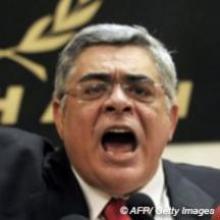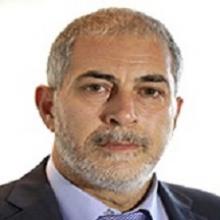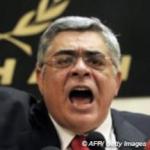Executive summary:
Golden Dawn is a now-defunct Greek neo-Nazi party that rose from a marginal role in Greek politics to become the third-largest political force in the country in the wake of the 2008-09 global financial crisis and the subsequent implementation of severe austerity measures. Party members have been involved in hundreds of acts of violence against immigrants and leftists across Greece. After a murder investigation from 2013 implicated at least one Golden Dawn Member of Parliament (MP) and several other members, further investigation into the political party—including through photos, videos, and phone records in the prosecutor’s case file—revealed a group whose members have illegally possessed firearms and explosives, and participated in money laundering, human trafficking, aggravated assault, and protection rings. One ex-member of Golden Dawn has claimed that the party discussed plots to overthrow the Greek government using “tanks.” After a five-year trial, Greece’s courts declared Golden Dawn a criminal organization and convicted its leaders for a multitude of crimes in October 2020.
Golden Dawn was founded in the 1980s by neo-Nazi Nikolaos Michaloliakos. The party has long used strongly racist and anti-Semitic rhetoric, and the ancient Greek symbol used by Golden Dawn closely resembles the Nazi swastika. In particular, the party has focused its platform on opposing immigration and immigrants; its campaign slogan during the 2012 Greek general election was “So we can rid this land of filth.”
For over two decades, the party enjoyed negligible support, securing less than 1 percent of the vote in local, national, and European elections. However, after the 2008-09 global financial crisis and the Greek government’s subsequent imposition of severe austerity measures that caused widespread unemployment and poverty, Golden Dawn’s electoral success improved dramatically.
As welfare provision and public services were dramatically rolled back in recent years due to the austerity measures, Golden Dawn worked to fill this gap. The party provided a range of social services—particularly to poverty-stricken working-class families—including soup kitchens, medical advice, “Greek-only” blood banks, and donations of food and clothing. The exclusive availability of these services to Greek citizens led Athens Major George Kaminis in 2013 to refer to them as “soup kitchens of hatred.”
In the 2012 Greek general election, Golden Dawn secured just under 7 percent of the countrywide vote, which translated into 18 seats in the Greek parliament and made the party the fifth-largest political force in Greece. Since then, Golden Dawn had been able to maintain its electoral success in successive local and European elections and even increased its share of the vote. In 2014, Golden Dawn was elected to the European Parliament, taking three of 21 available seats for Greece. However, one elected Member of the European Parliament (MEP)—Eleftherios Synadinos—resigned from Golden Dawn in April 2018 and founded the Patriotic Radical Union (PAT.RI.E.). He resumed his MEP function as a non-attached member. Following the result of the European elections in 2014, Golden Dawn constituted the third-largest political force in Greece. In the September 2015 elections, Golden Dawn again finished third in Greece’s general elections, despite key leaders having to run for office behind bars. In July 2019 national elections, however, Golden Dawn won less than 3 percent of the vote and failed to meet the mandated voter threshold to send representatives to the Greek parliament.
Golden Dawn long matched political action with violence, with its members taking part in hundreds of violent attacks. Golden Dawn members are also suspected of responsibility for the murders of two immigrants. Beginning in 2014, Golden Dawn tried to soften its image, attempting to rebrand itself as a nationalist organization and claiming that prior Golden Dawn references to the Nazi Party were “youthful indiscretions.” In order to appeal to more middle-class voters, Golden Dawn candidates in subsequent European elections included university professors, lawyers, surgeons, businesspeople, and a former NATO commander. However, despite these cosmetic image changes, Golden Dawn’s violent attacks against immigrants and leftists continue.
The murder of anti-fascist rapper Pavlos Fyssas in September 2013 by Golden Dawn member Giorgos Roupakias triggered widespread outrage across Greece and led to a government-led crackdown on the group. As the Greek constitution does not permit banning political parties, the government attempted to limit the group’s activities and funding through criminal investigations and prosecutions. In February 2015, a judicial panel charged 69 key party leaders—including several MPs—with belonging to a criminal organization, as well as possession of illegal weaponry, extortion, bodily harm, and murder. On March 20, 2015, all detained Golden Dawn members were released because Greek law allows for a maximum pre-trial detention period of 18 months. The trial commenced on April 20, 2015, and a verdict was reached on October 7, 2020.
As the criminal investigations have led to a discontinuation of Golden Dawn’s state funding for the party—previously a major source of the party’s income—Golden Dawn sought to explore international avenues to widen its reach and to attract funding by opening offices in the United States and Canada where large Greek diaspora communities exist. Golden Dawn also used the trials to present itself as the victim of state repression. On November 6, 2019, party leader and founder Nikos Michaloliakos took the stand for the first time. He denied charges of running a criminal organization and claimed the accusations were a political tactic to denigrate and dismantle Golden Dawn.
After a five-year trial, on October 7, 2020, the Athens Appeals Court declared Golden Dawn a criminal organization and found 13 of its leaders guilty of running a criminal organization. More than 68 defendants, including the entire group’s leadership, faced charges of operating a criminal organization while posing as a political group, attempted murder, possession of weapons, and employing violence to remove political rivals, migrants, and communists. The trial was the largest court hearing of Nazis to have taken place since the Nuremberg trials of 1945 to 1949 where 24 major political and military leaders of Nazi Germany were brought to trial before the International Military Tribunal. According to the Guardian, the case file included hundreds of incriminating videos and more than 6,000 documents of testimonies describing Golden Dawn’s organizational structure and activities which glorified Nazi culture.
In total, the court convicted 50 people—including 18 former Golden Dawn politicians—for membership in a criminal organization. Additionally, Giorgos Roupakias was convicted with murdering anti-fascist rapper Pavlos Fyssas, and 15 other members were convicted of conspiracy in the killing of Fyssas. Other convictions include five members found guilty of the attempted murder of an Egyptian fisherman, and four others convicted of grievous bodily harm for an attack on communist trade unionists. Party leader Nicholas Michaloliakos was sentenced to 13 years in prison. Other leaders receive sentences ranging from five to 13 years. While the verdict did not formally ban the organization, Golden Dawn’s failure to meet the 3 percent threshold in Greece’s 2019 parliamentary elections and the subsequent October 2020 shut down of the group’s local offices have effectively rendered Golden Dawn defunct.
Doctrine:
Golden Dawn openly advocated national socialism, racism, and anti-Semitism. Hitler, the Third Reich, Rudolf Hess, the Waffen SS, and the swastika were Golden Dawn’s idols and emblems and appeared repeatedly in its publications and rallies. In 1987, Golden Dawn leader Nikolaos Michaloliakos wrote in the party magazine, “We are the faithful soldiers of the National Socialist idea and nothing else.” Even as recently as 2012, Michaloliakos denied the Holocaust: “I have read a lot of books casting doubts on the number of six million Jews… There were no ovens, no gas chambers, it’s a lie.”
In Golden Dawn’s ideology, the absolute enemy of the nation—indeed, of the entire planet—was the United States and liberalism. This theory was based on notions of the “cultural superiority” of an “Orthodox Greek nation” threatened by “Western bourgeois culture” and a supposed “Jewish conspiracy.” Correspondingly, the real “friends of the nation” were considered to be Russia, Serbia, and other Orthodox Christian countries, the Arabs, who are “oppressed by Zionism,” and every right-wing regime worldwide, as long as it is an enemy of the United States and Israel. But like other right-wing extremist parties, Golden Dawn was also fighting the purported “Islamification” of Greece and Europe.
Special notice should be made of the participation of Golden Dawn members in ethnic cleansing of Bosnian Muslims in Srebrenica in 1995. Golden Dawn sent some of its members to join the so-called “Greek Volunteer Guard” to fight on the side of the Bosnian Serbs lead by Radovan Karadžić and Ratko Mladić. After the massacres at Srebrenica, this “Guard” triumphantly raised the Greek flag side-by-side with the Chetnik flag.
Golden Dawn campaigned on a strongly anti-immigration platform, using racist slurs openly and regularly. For example, in a 2012 interview, two parliamentarians demanded that only people with “Greek blood” should be allowed to participate in elections. The party’s xenophobia was coupled with an apparent fundamental contempt for liberal democracy. In 2012, Golden Dawn MP Ilias Kasidiaris made international headlines when he physically attacked two female left-wing MPs on a live talk show because they had criticized Golden Dawn. When Golden Dawn leader Nikolaos Michaloliakos briefly appeared in parliament in June 2014 for a vote to strip him of his immunity from prosecution on further charges, he verbally abused other MPs. Outside of the parliament, hundreds of Golden Dawn supporters sang the national anthem and insulted MPs, shouting “Scum! Traitors!”
Beginning in 2014, Golden Dawn sought to soften its image in order to appeal to a bigger spectrum of voters. During the 2014 European elections, for example, many of Golden Dawn’s candidates were middle-class professionals, including university professors, lawyers, surgeons, businesspeople, and a former NATO commander. When Golden Dawn organized public events, it began rejecting the neo-Nazi label and preferred to present itself as a “nationalist” and “patriotic” organization (although there were exceptions to this practice). Partly due to Golden Dawn’s agitation, brutal attacks on immigrants and other hate crimes (mainly against leftists) became common phenomena in Greece.
Greek neo-Nazis also engage in social action—but only for “real Greeks.” They have established an expansive outreach program that provides services to the elderly in impoverished areas and distributes food and clothing to the needy (termed by Athens Mayor George Kaminis as “soup kitchens of hatred”), drawing comparisons to Hezbollah by party leaders themselves. As welfare services such as health care provided by the state were drastically rolled back due to the country’s austerity measures, Golden Dawn tried to fill the gap—for example, by establishing a network of doctors that provide medical advice to impoverished families.
Organizational Structure:
According to a report by a Greek prosecutor, Golden Dawn’s leadership structure was similar to a “military-type operational force whose members attack mainly immigrants.” Inspired by the Führerprinzip prominent in Nazi ideology, Golden Dawn’s leadership structure was strictly hierarchical. Consequently, Greek prosecutors argued that Golden Dawn’s leadership orchestrated the violent attacks carried out by members of the group.
In 2013, the Guardian reported that members of the Greek armed forces had been training “Golden Dawn hit squads,” paramilitary-like structures that allegedly encompass up to 3,000 members.
In October 2020, a Greek court declared Golden Dawn to be a criminal organization and convicted 50 people—including 18 former Golden Dawn politicians—for membership in a criminal organization. While the verdict did not formally ban the organization, Golden Dawn’s failure to meet the 3 percent threshold in Greece’s 2019 parliamentary elections and the subsequent October 2020 shut down of the group’s local offices effectively rendered Golden Dawn defunct.
Among those convicted in October 2020 was former Golden Dawn spokesman Ilias Kasidiaris. In June 2020, prior to his conviction, Kasidiaris formed “Greeks for the Fatherland,” a.k.a. the Hellenes party. In a video posted on YouTube, Kasidiaris claimed the new party was a movement for the “national preservation and revival of Hellenism.” The party maintained many of the same platforms endorsed by Golden Dawn, particularly the focus on ending illegal immigration. By August 2021, the group was reported to have over 20,000 registered members. In May 2023, Greece’s supreme court ruled the Hellenes party was clearly the “successor” to Golden Dawn and banned the party from participating in the country’s June 2023 parliamentary elections.
Financing:
Public funding originally constituted an important source of financing for Golden Dawn. For example in 2013, 873,000 euros in Greek state funding had been allocated to the party. However, following a vote in parliament in October 2013, state funding for Golden Dawn was cut off due to the ongoing investigation by state prosecutors as to whether Golden Dawn is a criminal organization.
Golden Dawn declined to shed light on its funding sources, stating simply that it was funded by supporters. Journalist Dimitris Psarras alleged that Golden Dawn has received financial support from like-minded groups in Europe and Russia. Golden Dawn also used its satellite offices to raise money and donations for its cause. In September 2014, the London-based Guardian reported that Golden Dawn’s Australian branch had raised money through an unregistered charity called Voithame Tin Ellada (VTE).
Recruitment:
Golden Dawn employed a range of strategies to recruit members, including grassroots mobilization and participating in neighborhood initiatives. It attracted widespread appeal, boasting thousands of members and attendants at Golden Dawn rallies. Golden Dawn also worked to appeal to Greek expatriates, including those living in Australia, Canada, and the United States. The group also recruited online. According to its website in 2015, Golden Dawn New York aims “to counter the lies and propaganda against Golden Dawn in the English speaking world by providing official translations of Golden Dawn articles.” Golden Dawn New York’s website has since been shut down.
Within the country, Golden Dawn heavily focused on recruiting from Greece's youth population. The group used gyms, athletic clubs, and martial arts clubs as grounds for recruiting youths. It actively recruited at high schools, and even stands accused of launching an indoctrination course called “national awakening,” aimed at children ages 6-10. These sessions have included lessons on neutral subjects like ancient Greek history and the Christian faith. However, according to Greece’s education ministry, the course was a blatant form of manipulation, aimed to instill a sense of Greek supremacy. The competing Greek party Syriza accused Golden Dawn of “brainwashing little tots with Nazi propaganda.” Educators and commentators have also noted similarities to the Nazi method of indoctrination.
In 2011, Golden Dawn opened an office in Heraklion, the capital of Crete. For years, party members approached young people “in cafes and the gym, presenting themselves as family and protectors. They took them for coffee and gave them lessons on Greek history.” Following the 2013 murder of Pavlos Fyssas, local teachers made an effort to teach history in a less nationalistic manner as well as discuss and confront fascist ideology in the classroom. More than 50 schools also organized an anti-fascist festival. In April 2018, militant activists destroyed Golden Dawn’s office in Heraklion, causing them to leave the island.
Golden Dawn had a youth club, Galazia Stratia (Blue Army), which used bribes to recruit younger members. It handed out cellphones to students, claiming that the kids need access to phones in order to protect themselves from neighborhood crime. They even aim to appeal to Greek youth through music. As of 2013, two of Golden Dawn’s members of parliament were musicians, and had used music to propagate violent and hateful messages. One MP was the bass player in a band that praised Hitler’s Auschwitz death camp in one song, and had another song called “Speak Greek Or Die.” Members of the Galazia Stratia were also regular participants and instigators of soccer hooliganism. Analysts believed that strong emotional ties to a soccer team help create a sense of identity and belonging that is particularly appealing to disaffected youth. In November 2017, hooligans of the Thessaloniki PAOK soccer club insulted and attacked local Pakistani Muslims who publicly celebrated the birth of the Prophet Mohammed.
In public platforms, Golden Dawn propagated an extremist Greek supremacy ideology at the exclusion of the country’s immigrants, homosexuals, and religious and ethnic minorities. The group appeared to have capitalized on the immigration crisis to curry favor with the population. One Golden Dawn MP said, “There are no legal migrants in Greece, not even one.” The party’s 2012 election slogan was similarly xenophobic and ominous: “So we can rid this land of filth.” Golden Dawn has also benefitted from the country’s financial crisis. In line with its nationalist, supremacist ideology, the party refused to accept any austerity measures from Greece’s creditors, endearing the group to the mainstream Greek population.
Training:
During the highly publicized Golden Dawn trial, prosecutors painted Golden Dawn as a criminal organization posing as a political party. In doing so, the prosecution pointed to evidence of military training and attack battalions that, according to one ex-member of Golden Dawn, were preparing “to overthrow the Greek government.” Evidence from the prosecutors showed Golden Dawn members in military clothing wielding knives, swords, handguns, rifles, and even a bazooka. According to the ex-member of Golden Dawn, “They kept telling us that we’ll break into the parliament with tanks.”
According to the ex-member—serving as a witness in the trial against Golden Dawn MPs—Golden Dawn even recruited a butcher in order to train its members in the art of using a knife effectively so they could learn to “neutralize opponents.” The butcher also allegedly supplied guns to Golden Dawn members.
Also Known As:
- National Dawn
- Popular Association – Golden Dawn
- Λαϊκός Σύνδεσμος – Χρυσή Αυγή
- Χρυσή Αυγή


















